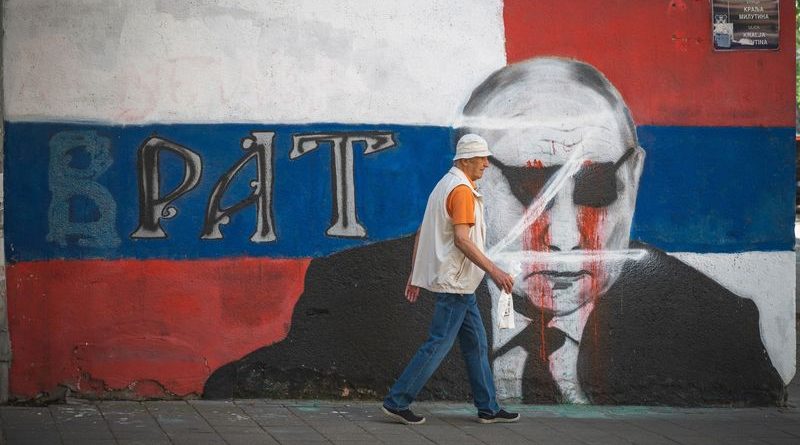Putin Is Pushing Serbia and Bosnia to Back His Ukraine War
By Fletcher Dean Emeritus James Stavridis, former supreme allied commander of NATO
Even as Russian President Vladimir Putin prosecutes his vicious and failing war in Ukraine, he continues to cast his ambitions further afield. Russia is trying to undermine democracies throughout Europe, funneling funds and support to far-right groups and propaganda operations.
Putin has found particularly fertile ground in the Balkans, pushing his view that the North Atlantic Treaty Organization is intent on marginalizing the Russian, Slavic, Eastern Orthodox world. At the center of these efforts is Serbia, the most pivotal former Yugoslav state that isn’t a NATO member.
When I was supreme allied commander at NATO from 2009 to 2013, I often visited the Balkans. The alliance had more than 15,000 troops on a peacekeeping mission in Kosovo, a small breakaway republic that defied Serbia and declared independence. This had sparked a significant war in 1999, in which NATO planes bombed the Serbian capital, Belgrade. Nonetheless, recent Serbian governments have worked to improve relations with the West and to gain European Union membership.
But there are increasingly dangerous forces supporting Putin in Serbia and smaller neighboring nations. Russia has refused to recognize Kosovo; it was almost certainly behind a coup attempt in tiny Montenegro in 2016; and it has supported separatist elements in Bosnia and Herzegovina.
Above all, Putin wants to keep Serbia and Bosnia out of NATO and the EU. He also wants to galvanize support for his Ukraine disaster, and to generally distract the West by manufacturing tensions — especially between Serbia and Kosovo.
Serbian President Aleksandar Vucic has been walking a fine line between Moscow and the West. His government voted in favor of a United Nations resolution condemning Russia’s invasion; it rejected Putin’s annexation of Russian-occupied territories in Ukraine last week; and it has been somewhat supportive of allowing transshipments of humanitarian and nonlethal military equipment to Kyiv. (Unfortunately, Vucic also signed a gas deal with Russia in May.)
Within the complicated politics of Bosnia and Herzegovina, Putin continues to cultivate support. Last month, he hosted the Milorad Dodik, an unreconstructed Serbian nationalist who leads the ethnic Serbian entity within Bosnia, the Republika Srpska. One suspects Dodik would happily destroy his nation to please his master in Moscow.
So how can the West counter Russia’s efforts? The roughly 3,500 remaining peacekeeping forces are important, but not determinative. The real competition has shifted to information warfare and economic engagement.
On the information side, Moscow has the upper hand. It is deeply involved in spreading false narratives about the war, seeking to portray Russia’s “special military operation” as a pan-Slavic mission to unite the wayward Ukrainians (who are Slavs themselves) with Mother Russia. This is playing well on the far right, as expected, but also among the population as a whole: A June poll showed that almost two-thirds of Serbians said NATO is to blame for the war, while around 10% viewed Russia as mostly or entirely culpable.
Fortunately, Moscow has little to offer in the way of economic incentives. Serbian exports to Europe are nearly 15 times greater than those to Russia, and would increase dramatically with EU membership. More immediately, Serbia and Bosnia want to maintain their nationals’ ability to travel without visas in the EU, where Russians are increasingly being shut out.
The key for the US, the EU and NATO is simple: Don’t take the Balkans — especially Serbia and Bosnia — for granted. Those two nations should be kept on the gradual path to EU membership, even if at times they aren’t perfect allies against Russia, and NATO should keep working closely with them on military training and exercises.
Russia will continue to drive a wedge between the Balkans and the West. Serbia and Bosnia need to understand that while Moscow can offer natural gas supplies, that is a tactical temptation that pales in comparison to the strategic value of broad membership with Western Europe.
This piece is republished from Bloomberg.

